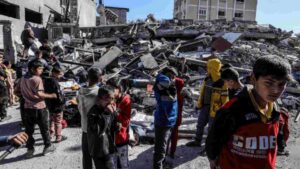United Nations announced on Monday that it will enhance its security measures for humanitarian aid operations in the Gaza Strip by bringing in more armored vehicles and personal protection equipment, following approval from Israeli authorities.
Scott Anderson, deputy humanitarian coordinator for the Occupied Palestinian Territory, stated that the approval was in response to a UN letter sent to Israel last month addressing safety and security concerns in Gaza. The escalation comes as the conflict between Israel and Palestinian militant group Hamas enters its tenth month, causing significant law and order challenges.
Historically, the UN has faced numerous obstacles in delivering aid to Gaza, primarily due to Israel’s stringent inspection and approval processes for all aid trucks. The situation has been exacerbated by “total lawlessness” within the enclave of 2.3 million people, with a global hunger monitor recently highlighting a high risk of famine.
Anderson confirmed that the UN would begin deploying more armored vehicles and protective equipment into Gaza starting Tuesday. Additionally, some communications equipment, such as hand-held radios, has been approved, although discussions on stable internet access are ongoing. The UN seeks communication methods that do not rely on cell phone towers, deemed unreliable. However, Israeli authorities have expressed security concerns about potential Hamas access to satellite internet services.
Anderson emphasized the critical need to deliver aid in the appropriate quantity and quality but cited several hindrances, including movement restrictions, aid worker safety, unpredictable working hours, communication challenges, and fuel shortages. He noted the breakdown of law and order, with “crime families” impeding the free movement of aid within Gaza.
“The truck drivers that we use have been regularly threatened or assaulted,” Anderson said. “They’ve become less and less willing, understandably, to move assistance from the border crossings to our warehouses and then onto people that are in need.”
Currently, the UN manages to get between 25 and 70 aid trucks into northern Gaza daily, but commercial access remains restricted. In southern Gaza, despite efforts, the UN has struggled to exceed 100 trucks on a good day due to law and order issues, whereas commercial deliveries fare slightly better by paying protection money to local families and employing armed guards.
Aid officials estimate that about 600 trucks of humanitarian and commercial supplies are needed daily to meet the population’s needs in Gaza.
Anderson revealed that the UN is in discussions with various stakeholders to establish a police force to address the security issues hindering aid deliveries. In the meantime, efforts are underway to negotiate with the families obstructing aid distribution.
“It’s a few families that are trying to take advantage of this opportunity, and that’s why I’m confident if we get police back at work, they can address the issue,” Anderson concluded.














